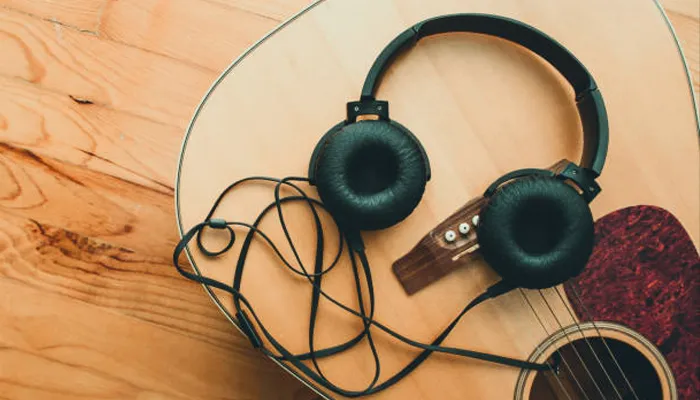You’ve been thinking about getting a new pair of headphones specifically for mixing and mastering your audio projects. As an avid gamer, you’ve wondered if your trusty gaming headphones would work in a pinch to also handle your mixing needs.
On the one hand, gaming headphones are designed primarily for gaming, so they emphasize a boosted low-end and surround sound for an immersive experience. On the other hand, they’re still headphones, so will they really be that bad for mixing? You’ve heard arguments on both sides, so you’re not sure what to think.
This article will explore whether gaming headphones can work for mixing or if you’re better off investing in a dedicated pair of studio headphones.
We’ll look at the key differences in their design and how that impacts sound. We’ll also provide some recommendations for gaming headphones that can do a passable job for mixing in a home studio on a budget versus studio headphones that will give you a more accurate representation of your audio.
Why Are Studio Headphones Considered the Standard for Mixing?
Studio headphones are considered the gold standard for mixing because they’re built specifically for the task. Here are a few reasons why:
Accurate, uncolored sound
Studio headphones provide a flat frequency response, meaning they don’t emphasize any particular frequencies. This allows you to make mixing decisions based on the actual sound, not the headphone’s coloration of it.
Gaming headphones, on the other hand, are tuned to enhance certain frequencies like bass to create an exciting experience, which won’t give you an accurate representation of your mix.
Sound isolation
Studio headphones also isolate you from outside noises. This allows you to focus on the finer details in your mix without distraction.
Gaming headphones typically don’t provide the same level of sound blocking since some ambient noise awareness can be helpful for gameplay. For mixing, though, isolation is key.
Reliability
Studio gear is built to high standards to handle the demands of professional use. Studio headphones are no exception. They’re rigorously tested to ensure consistent, reliable performance day after day.
Gaming headphones may start to deteriorate over time with heavy use, and their sound quality can be inconsistent from unit to unit.
When it comes to your mix, using pro-level studio headphones will give you the control, precision, and trustworthiness you need. If gaming headphones are all you have access to, they can work in a pinch, but for the best results, studio headphones are really your best option.
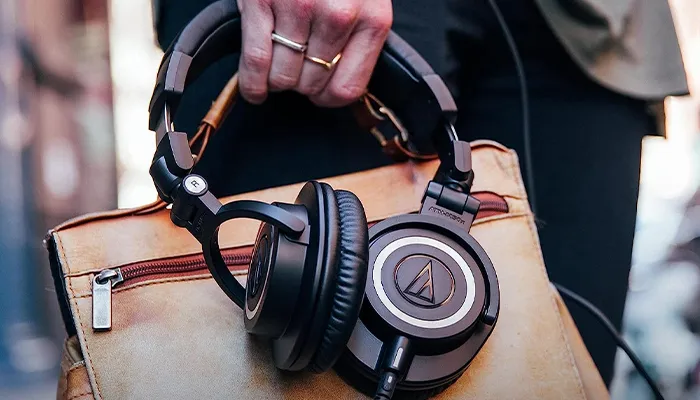
Are Gaming Headphones Suitable for Mixing?
Gaming headphones are designed for an immersive experience, so in theory, they should work great for mixing and editing audio. But are they really ideal for the job? Let’s consider some factors:
Sound Quality
Gaming headphones typically emphasize bass to create an exciting experience for gameplay. For mixing, you need a flat, accurate frequency response to properly balance all the elements in your track. Gaming headphones often lack the clarity and detail needed for critical listening.
Noise Cancelation
Gaming headphones aim to block outside noise so you can focus on the game. But for mixing, you need to hear your track clearly without coloration from noise-canceling circuitry. Open-back studio headphones are better for mixing.
Comfort
Gaming headphones are made for long gaming sessions, so they prioritize comfort. But for mixing, comfort is less important than audio quality. Studio headphones may feel less plush but provide a more transparent listening experience.
While gaming headphones can work in a pinch, for serious mixing and editing, you’ll get far better results from studio headphones designed specifically for audio production.
They provide the flat, detailed frequency response, open soundstage, and transparency needed to make balanced mixing decisions and craft professional tracks. If you’re ready to level up your mixes, studio headphones are the way to go.
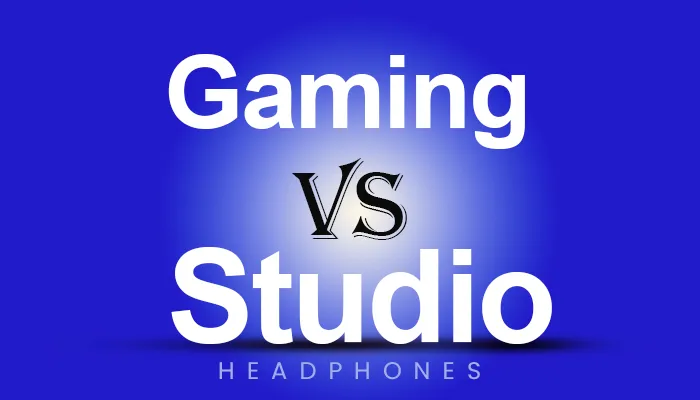
Key Differences Between Gaming Headphones and Studio Headphones
Gaming headphones and studio headphones may seem interchangeable, but there are some key differences to consider before using gaming headphones for mixing audio.
Design and Build
Gaming headphones are designed primarily for an immersive gaming experience, so they emphasize features like surround sound, noise cancelation, and a tight fit.
Studio headphones focus on providing a flat, balanced frequency response for accurate sound monitoring. They are built more durably since they are handled frequently. The earcups are also designed to be comfortable for long mixing sessions.
Sound Quality
Gaming headphones boost bass and treble for an exciting sound, while studio headphones aim for a neutral, natural tone.
The flatter frequency response of studio headphones allows you to make better mixing decisions, as you’ll hear the audio as it really is. With gaming headphones, the hyped-up sound could lead you to make unnecessary EQ changes.
Features
You won’t find extras like RGB lighting, virtual surround sound, or built-in microphones on studio headphones. Studio headphones provide the essentials for mixing: good sound quality, comfort, and durability.
The features of gaming headphones, while great for gaming, only add cost without benefit for mixing and mastering audio.
While gaming headphones can work in a pinch, studio headphones are really the only choice if you want to mix with confidence.
They provide the flat, full-range frequency response, comfort, and build quality that mixing demands. Using dedicated studio headphones will lead to better results and a more professional workflow.
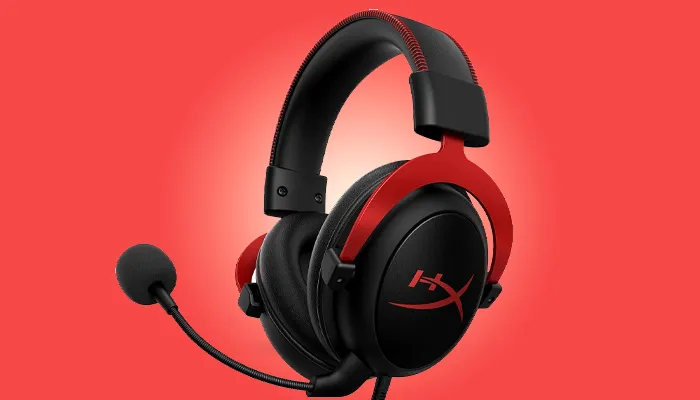
Pros of Using Gaming Headphones for Mixing
Using gaming headphones for mixing your audio can have some benefits.
Comfortable Fit
Gaming headphones are designed for long periods of wear, so they tend to be very comfortable and lightweight. The ear cups fit snugly over your ears without causing fatigue. This means you can have them on for hours while mixing without discomfort.
Accurate Sound
Many gaming headphones offer high-resolution sound with a wide frequency range to provide an immersive experience. This also makes them suitable for mixing, where you need to hear all the subtle details. The drivers are optimized for positional audio, so you can pick out instruments and elements in the stereo field with precision.
Noise Isolation
The ear cups on most gaming headphones fully enclose your ears to block outside noise. This isolation allows you to focus on what you’re mixing without distractions. You’ll be able to hear the quiet details and make adjustments even in a noisy environment.
Compatibility
Gaming headphones typically work with most devices like computers, gaming consoles, phones, and tablets. So you can use the same pair of headphones for both mixing on your laptop or desktop as well as gaming. Some even come with multiple input options, so you can connect to several devices at once.
While gaming headphones may work in a pinch, for serious mixing it’s best to invest in a pair of studio headphones designed specifically for audio production. They provide a balanced, uncolored sound and the most accurate representation of your mix.
But if you’re on a budget or just getting started, gaming headphones can be a versatile and affordable option to dip your toes in the water.

Cons of Using Gaming Headphones for Mixing
Using gaming headphones for mixing audio can be convenient, but there are some downsides to consider before relying on them for professional work.
Limited frequency response
Gaming headsets are designed primarily for gaming, not professional audio work. They typically have a limited frequency response that favors midrange and bass frequencies which are important for experiencing surround sound and big explosions in games.
However, for mixing you need headphones that provide a flat, accurate frequency response so you can properly balance all the frequencies in your mix.
Not the most accurate
Gaming headphones are made more for an engaging experience than pinpoint accuracy. They may boost certain frequencies to create a more dramatic sound for games, but for mixing you need a headphone that provides a transparent, uncolored sound so you can make precise mixing decisions. Subtle details and imperfections in the mix may get lost or exaggerated using gaming headphones.
Usually closed-back
Most gaming headsets have a closed-back design which provides more isolation. While that can be good for immersing you in a game, for mixing you generally want an open-back headphone that provides a more natural, open soundstage. Closed-back headphones can make your mixes sound unnatural and cluttered.
Additional features add cost
Gaming headphones include additional features like built-in microphones, virtual surround sound, and customizable RGB lighting which add to the cost.
If you only need headphones for mixing, these additional features provide no benefit and you end up paying more. You can get a high-quality set of studio headphones for the same price that will work much better for mixing.
In summary, while the convenience and low cost of gaming headphones may be appealing, for serious mixing work you really need a proper set of studio headphones designed specifically for audio production to get the accuracy and natural sound you need. Gaming headphones should be left for gaming.
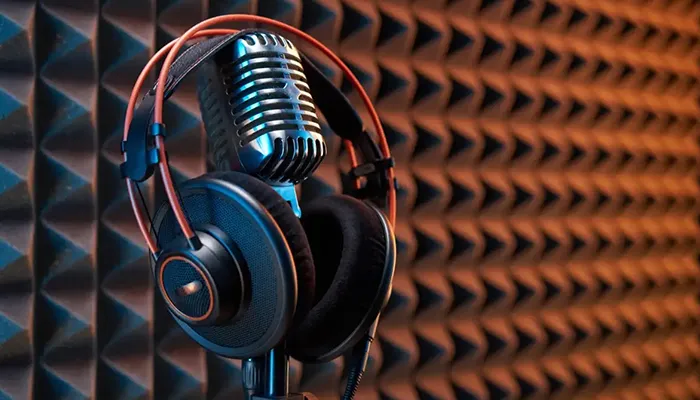
Comparison of Studio Headphones and Gaming Headsets for Mixing
When it comes to using gaming headsets for mixing, there are a few factors to consider:
Accuracy
Gaming headsets are designed primarily for an immersive gaming experience, not critical listening. The frequency response may be uneven, emphasizing bass and treble, rather than providing a flat, balanced reproduction of the full frequency spectrum needed for mixing. Studio headphones are engineered specifically for audio production, with a neutral, accurate sound.
Comfort
Gaming headsets are built for long periods of continuous use, so they prioritize comfort. The padded ear cups and adjustable headband are meant for maximum coziness during extended gaming sessions.
However, their loose fit and ample padding can make it difficult to get a good seal for monitoring headphone bleed or precisely judging panning and depth. Studio headphones typically have a tighter fit for better isolation.
Durability
Gaming headsets undergo rigorous testing to ensure they can withstand the stresses of constant use, dropping, and travel.
They are very durable. Studio headphones, on the other hand, are handled more gently since they remain in a controlled studio environment. Durability is still important but not the top priority.
While gaming headsets and studio headphones share some useful features like noise cancelation, detachable cables or Bluetooth connectivity, and inline controls, their different purposes mean significant compromises in audio quality and precision for mixing. For critical listening, studio headphones reign supreme.
If you’re on a budget though, certain gaming headsets could work in a pinch, as long as you understand their limitations. The choice comes down to your needs and how demanding your projects are.
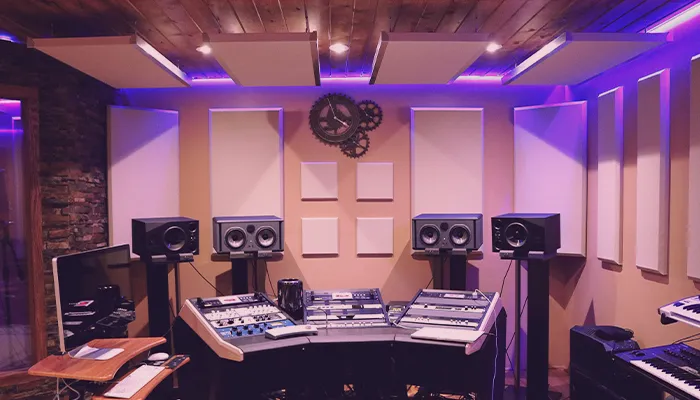
Our Verdict: Should You Use Gaming Headphones for Mixing?
So, should you use gaming headphones for mixing? Our verdict is: it depends.
Pros
Gaming headphones are designed for an immersive experience, so they often have high-quality components that provide great sound. The bass is usually solid, the highs are crisp, and the soundstage is wide, allowing you to pick out details.
Many are also built to be comfortable for long periods. If you’re on a budget, gaming headphones can be an affordable option to get started.
Cons
Gaming headphones are tuned for gaming, not music production, so the frequency response may be unbalanced. The bass could be overly exaggerated, or the highs harsh.
They typically don’t have a neutral, flat response required for mixing. The stereo imaging and separation may also be optimized for gaming, not mixing.
Overall, while gaming headphones can work in a pinch, especially if you’re just getting started, we don’t recommend them for serious mixing work.
For that, you’re better off investing in a pair of studio headphones designed specifically for music production. They’ll provide the balanced, neutral sound you need to make mix decisions with confidence.
If you do use gaming headphones, listen to a lot of reference tracks in the genre you’re mixing to get used to their sound. Compare your mixes on multiple devices as well.
With time, you can learn to compensate for the headphones’ coloration. But for the most accurate results, studio headphones remain the best choice for mixing.
Conclusion
So there you have it – gaming headphones can absolutely work for mixing, but it really comes down to your needs, preferences, and budget. If you’re on a tight budget but still want great sound, gaming headphones are a solid choice.
However, if you’re a professional producer investing in high-quality gear, you’ll probably want to spring for studio headphones to get the flattest, most accurate frequency response.
At the end of the day, the only thing that really matters is that you can hear your tracks clearly and make them sound as awesome as possible. Now get to producing that next hit record! The music world is waiting.
- Charging Bluetooth Headphones During Use: Is It Possible? - January 9, 2024
- Why Over-Ear Headphones Best for Hearing Health? (7 Reasons) - December 12, 2023
- Fixing the Bose Earbuds Not Charging in Case Problem: Solutions That Work - November 24, 2023
